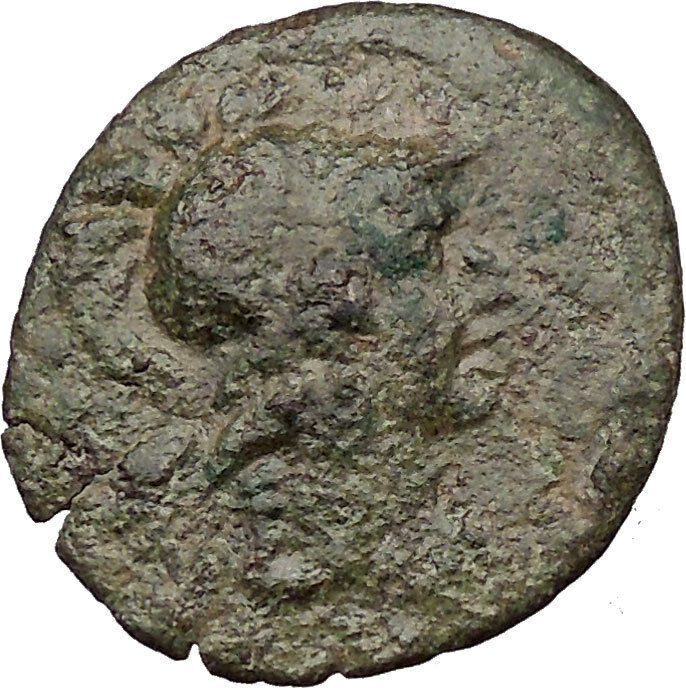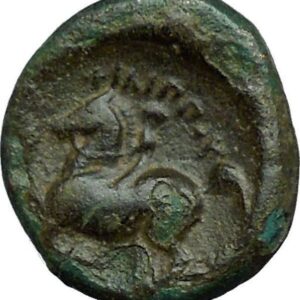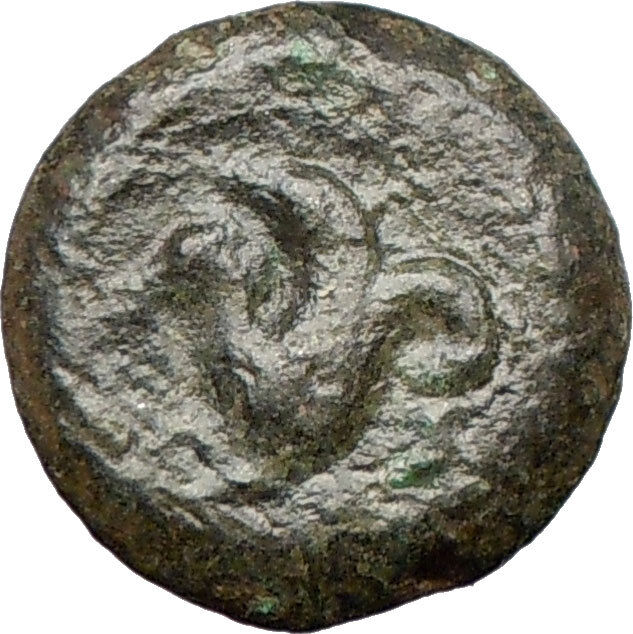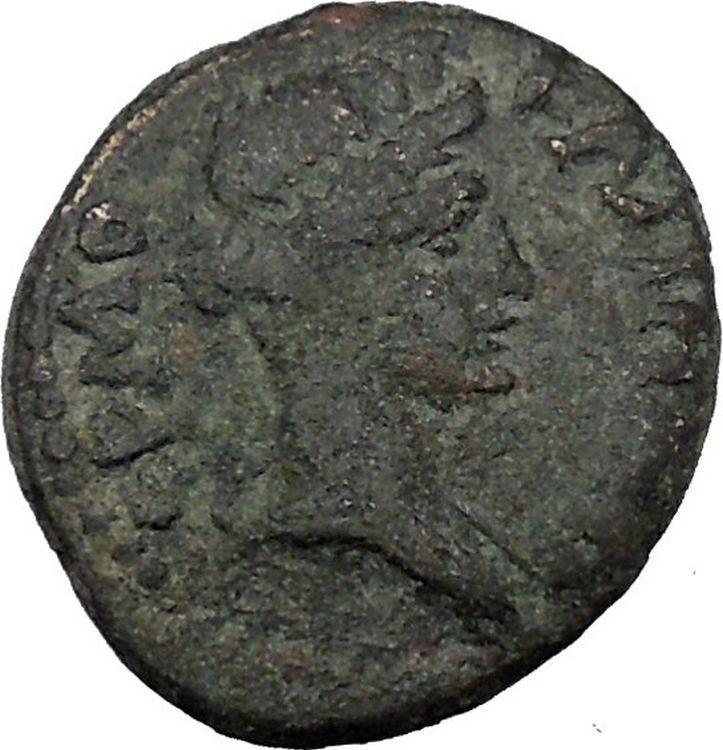|
Greek City of
Kolophon
in
Ionia
Bronze 18mm (5.54 grams) Struck 320-294 B.C. under magistrate Ikesios
Reference: Sear 4354 var.; Kinns 103; Milne, Colophon 136; SNG Copenhagen 166
Laureate head of Apollo right.
Horseman prancing right, armored and holding spear couched; lyre and K O Λ
in
field above, IKEΣIOΣ below.
Situated several miles inland, on the river Halesos, Colophon was an important
city and claimed to be the birthplace of Homer. The famous oracle of Apollo
Klarios was within its territory.
You are bidding on the exact item pictured,
provided with a Certificate of Authenticity and Lifetime Guarantee of
Authenticity.
Colophon
(Greek
Κολοφών) was a city in the region of
Lydia
in
antiquity dating from about the turn of the first

millennium-BC. It was likely
one the oldest of the twelve
Ionian League
cities, between
Lebedos
(120 stadia
to the west) and
Ephesus
(to
its south) and its ruins are in the eponymously named modern region of
Ionia
.
The city’s name comes from the word κολοφών, ‘summit’, which is also the
origin of the bibliographic term ‘colophon‘,
in the metaphorical sense of a ‘crowning touch’, as it was sited along a
ridgeline. The term “colophony”
for rosin
comes
from the term colophonia resina, that is, resin from the pine trees of
Colophon, which was highly valued for the strings of musical instruments.
The ruins of the city are at the
Castro of Ghiaour-Keui
, a minor village in
İzmir
,
Menderes
.
//
Antiquity
In Greek antiquity two sons of
Codrus
,
King of Athens
, established a colony there. It was the birthplace of the
philosopher Xenophanes
and the poet
Mimnermus
.
After the death of Alexander the Great,
Perdiccas
expelled the Athenian settlers on
Samos
to Colophon, including the family of
Epicurus
,
who joined them there after completing his military service.
The cavalry of Colophon was renowned. In the third century BC, it was
destroyed by
Lysimachus
—a
Macedonian
officer, one of the successors (Diadochi)
of
Alexander the Great
, later a king (306 BCE) in
Thrace
and
Asia Minor
, during the same era when he nearly destroyed (and did depopulate
by forced expulsion) the neighboring Ionian League city of
Lebedos
.
Notium
served as the port, and in the neighbourhood was the village of
Clarus
, with
its famous temple and oracle of
Apollo Clarius
, where
Calchas
vied
with Mopsus
in
divinatory science.
In Roman
times, after
Lysimachus
‘
conquest, Colophon failed to recover (unlike
Lebedos
) and lost its importance; actually, the name was transferred to the
site of the port village of
Notium
, and the latter name disappeared between the
Peloponnesian War
and the time of
Cicero
(late
400s BC
to
1st
century BC
).
Additionally, the city, as a major location on the Ionic mainland, was cited
as a possible home or birthplace for
Homer
. In his
True History, Lucian
lists it as a possible birthplace along with the island of
Khios
and the city of Smyrna, though Lucian’s Homer claims to be from
Babylon
.
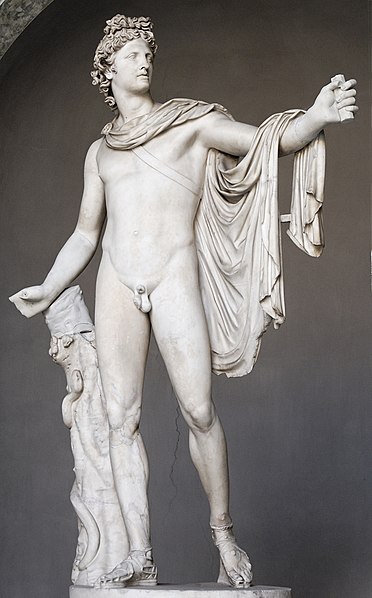
Apollo Belvedere
,
ca. 120–140 CE
Apollo
is one of the most important and complex of the
Olympian deities
in
ancient Greek
and
Roman religion
,
Greek
and
Roman mythology
, and
Greco
–Roman
Neopaganism
. The ideal of the
kouros
(a beardless, athletic youth),
Apollo has been variously recognized as a god of light and the sun, truth and
prophecy, healing, plague, music, poetry, and more. Apollo is the son of
Zeus and Leto
, and has a twin sister, the chaste
huntress Artemis
. Apollo is known in Greek-influenced
Etruscan mythology
as Apulu.
As
the patron of Delphi
(Pythian Apollo), Apollo was an
oracular
god—the prophetic deity of the
Delphic Oracle
. Medicine and healing are
associated with Apollo, whether through the god himself or mediated through his
son Asclepius
, yet Apollo was also seen as a god
who could bring ill-health and deadly
plague
. Amongst the god’s custodial charges,
Apollo became associated with dominion over
colonists
, and as the patron defender of herds
and flocks. As the leader of the
Muses (Apollon Musegetes) and director of their choir, Apollo
functioned as the patron god of music and poetry.
Hermes
created the
lyre for him, and the instrument became a common
attribute of Apollo
. Hymns sung to Apollo were
called paeans
.
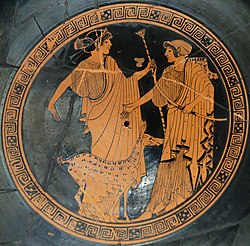
Apollo (left) and
Artemis
.
Brygos
(potter signed), Tondo of an
Attic red-figure cup c. 470 BC,
Musée du Louvre
.
In Hellenistic times, especially during the 3rd century BCE, as Apollo
Helios he became identified among Greeks with
Helios
,
Titan
god of the sun
, and his sister Artemis
similarly equated with
Selene
, Titan
goddess of the moon
In Latin texts, on the other hand,
Joseph Fontenrose
declared himself unable to
find any conflation of Apollo with
Sol
among the
Augustan poets
of the 1st century, not even in
the conjurations of Aeneas
and
Latinus
in
Aeneid
XII (161–215).
Apollo and Helios/Sol remained separate beings in literary and mythological
texts until the 3rd century CE.
Origins

The Omphalos
in the Museum of
Delphi
.
The cult centers of Apollo in Greece,
Delphi
and
Delos
, date from the 8th century BCE. The Delos
sanctuary was primarily dedicated to
Artemis
, Apollo’s twin sister. At Delphi,
Apollo was venerated as the slayer of
Pytho
. For the Greeks, Apollo was all the Gods
in one and through the centuries he acquired different functions which could
originate from different gods. In
archaic Greece
he was the
prophet
, the oracular god who in older times
was connected with “healing”. In
classical Greece
he was the god of light and of
music, but in popular religion he had a strong function to keep away evil.
From his eastern-origin Apollo brought the art of inspection from “symbols
and omina
” (σημεία και τέρατα : semeia kai
terata), and of the observation of the
omens of the days. The inspiration oracular-cult was probably
introduced from Anatolia
. The
ritualism
belonged to Apollo from the
beginning. The Greeks created the
legalism
, the supervision of the orders of the
gods, and the demand for moderation and harmony. Apollo became the god of
shining youth, the protector of music, spiritual-life, moderation and
perceptible order. The improvement of the old
Anatolian
god, and his elevation to an
intellectual sphere, may be considered an achievement of the
Greek
people.
Healer and
god-protector from evil
The function of Apollo as a “healer” is connected with
Paean
, the physician of the Gods
in the Iliad
, who seems to come from a more
primitive religion. Paeοn is probably connected with the
Mycenean
Pa-ja-wo, but the etymology is the
only evidence. He did not have a separate cult, but he was the personification
of the holy magic-song sung by the magicians that was supposed to cure disease.
Later the Greeks knew the original meaning of the relevant song “paean”.
The magicians were also called “seer-doctors”, and they used an
ecstatic prophetic art which was used exactly by the god Apollo at the oracles.
In the Iliad, Apollo is the healer under the gods, but he is also the
bringer of disease and death with his arrows, similar to the function of the
terrible
Vedic
god of disease
Rudra
.He sends a terrible plague to the
Achaeans
. The god who sends a disease can also
prevent from it, therefore when it stops they make a purifying ceremony and
offer him an “hecatomb” to ward off evil. When the oath of his priest appeases,
they pray and with a song they call their own god, the beautiful Paean.
Some common epithets of Apollo as a healer are “paion” , “epikourios”, “oulios”, and “loimios” . In
classical times, his strong function in popular religion was to keep away evil,
and was therefore called “apotropaios” and “alexikakos” ,
throw away the evil).
In later writers, the word, usually spelled “Paean”, becomes a mere epithet of
Apollo in his capacity as a god of
healing
.
Homer illustrated Paeon the god, and the song both of
apotropaic
thanksgiving or triumph. Such songs were originally addressed to
Apollo, and afterwards to other gods: to
Dionysus
, to Apollo
Helios
, to Apollo’s son
Asclepius
the healer. About the 4th century
BCE, the paean became merely a formula of adulation; its object was either to
implore protection against disease and misfortune, or to offer thanks after such
protection had been rendered. It was in this way that Apollo had become
recognised as the god of music. Apollo’s role as the slayer of the
Python
led to his association with battle and
victory; hence it became the
Roman
custom for a paean to be sung by an army
on the march and before entering into battle, when a fleet left the harbour, and
also after a victory had been won.
Oracular cult

Columns of the
Temple of Apollo
at Delphi, Greece.
Unusually among the Olympic deities, Apollo had two cult sites that had
widespread influence: Delos
and
Delphi
. In cult practice,
Delian Apollo
and
Pythian Apollo
(the Apollo of Delphi) were so
distinct that they might both have shrines in the same locality.Apollo’s
cult
was already fully established when written
sources commenced, about 650 BCE. Apollo became extremely important to the Greek
world as an oracular deity in the
archaic period
, and the frequency of
theophoric names
such as Apollodorus or
Apollonios and cities named Apollonia testify to his popularity.
Oracular sanctuaries to Apollo were established in other sites. In the 2nd and
3rd century CE, those at
Didyma
and
Clarus
pronounced the so-called “theological
oracles”, in which Apollo confirms that all deities are aspects or servants of
an
all-encompassing, highest deity
. “In the 3rd
century, Apollo fell silent.
Julian the Apostate
(359 – 61) tried to revive
the Delphic oracle, but failed
|










